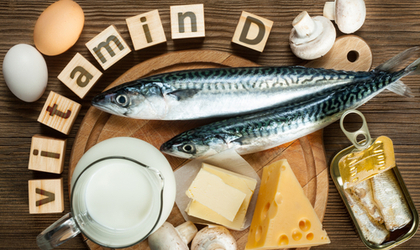
Vitamin D plays a multifaceted role in the body, supporting bones, teeth, and immunity. Though you can find small amounts of vitamin D in some foods, the best way to obtain vitamin D is from the sun; hence it’s more commonly referred to as the ‘sunshine nutrient’.
However, while your body can synthesise enough vitamin D in spring and summer, achieving relevant levels in the UK is inevitably harder in darker, colder months. As such, the long-standing advice from Public Health England is to ‘consider taking a daily supplement that contains 10 micrograms of vitamin D in autumn and winter’ (1).
Here, we outline the role of vitamin D in the body, the implications of low levels, and how best to optimise your intake.
What are the dangers of low vitamin D?
Since vitamin D helps to regulate the amount of calcium in the body – keeping teeth, bones and muscles healthy – low levels can result in bone deformities, such as rickets in children, and a bone condition called osteomalacia in adults (2).
According to the Association of UK Dietetics, you risk having low vitamin D levels if (3):
-
You spend little time outside
-
You are pregnant or breastfeeding
-
You are over 65 years
-
You have darker skin
-
You cover most of your skin when outside
-
You live in northern climates
-
You are housebound, a night-shift worker, or work in an office
-
You are significantly overweight
The role of vitamin D for immune health
Beyond supporting the function of bones, teeth, and muscles, vitamin D also plays a critically important role in immune health.
Crucially, vitamin D affects the immune system’s ability to activate T-cells, which help to fight infections. If there’s too much activation, autoimmune diseases – in which the immune system’s antibodies attack normal body tissues – may occur. On the other hand, if there’s too little activation, frequent infections may arise.
Empirical evidence reports that low levels of vitamin D are linked to both an increased risk of infection and autoimmune conditions (4).
In a large 2017 meta-analysis, researchers found that supplementing with vitamin D reduced the risk of developing a respiratory infection by 42 per cent in participants with low baseline levels of vitamin D (5).
How much Vitamin D do you need?
According to the NHS, babies up to the age of 1 year need 8.5 to 10 micrograms (µg) of vitamin D a day (6). Children from the age of 1 year and adults require a minimum of 10µg of vitamin D a day, as do pregnant and breastfeeding women, and those at risk of vitamin D deficiency (7).
Vitamin D2 and D3
There are two different types of vitamin D: vitamin D2 and D3. Ultimately, vitamin D3 is far more effective than vitamin D2 at improving vitamin D status.
Vitamin D2 (ergocalciferol): produced by plants, such as mushrooms, and other fortified foods.
Vitamin D3 (cholecalciferol): synthesised when the skin is exposed to enough sunlight. Animal products, like red meat, dairy, fish, and eggs, are the richest dietary sources of vitamin D3.
Sources of Vitamin D
Sunlight
The sun, undoubtedly, is the best source of vitamin D3. When your skin is directly exposed to the sun’s UVB rays, your body can synthesise this highly active form of vitamin D. According to empirical data, in the UK, Caucasian adults need around 13 minutes of midday sunlight exposure in summer, three times a week, to maintain healthy levels of vitamin D (8).
Since darker-skinned people have more melanin – a compound that protects skin against excess sun damage – they need to spend more time in the sun. Research suggests darker-skinned people may need anywhere between 30 minutes and three hours in the sun to produce sufficient amounts of vitamin D (9). Unfortunately, this means darker-skinned people are often at a higher risk of deficiency in the UK.
Dietary Sources
Vitamin D3 is also naturally found in a handful of dietary sources, including red meat, oily fish, egg yolks, liver exposed to sunlight. It may be noted, however, that you would need to eat these foods almost every day to get relevant levels of vitamin D3.
Mushrooms and fortified foods, like fat spreads, breakfast cereals, orange juice, and milk, also contain smaller amounts of vitamin D2, however, this is less readily absorbed by the body.
Which is the best form of Vitamin D supplement?
Vitamin D3 drops
Tasteless and odourless, our Vitamin D3 Drops (20ml) are ideal for children and adults who can’t swallow tablets. Simply add to food or drink. And with 5 μg a drop, you can tailor your daily intake.
Vitamin D3 tablets
Based on PHE’s guidance, most of our single vitamin D supplements deliver at least 10μg. In some cases, you may consider taking a higher strength supplement – one that delivers between 25μg (Vitamin D3 1000iu, Super Strength) and 50μg (Vitamin D3 2000iu, Maximum Strength) – to optimise your vitamin D intake, especially in winter months.
Since most vitamin D3 tablets are made from animal products, this can be problematic for vegans. Our Vegan Vitamin D3 1000iu uses a special oily extract of lichen, which is naturally rich in Vitamin D3 (plant-based cholecalciferol), to cater for those on plant-based diets.
Multivitamins
With at least 10μg of vitamin D3, our multivitamins are a convenient and easy way to ensure a regular intake of vitamin D, along with many other nutrients. You may choose to build on this amount to increase your intake.
Enjoyed this article? You can discover even more supplementation advice on our blog.
References:
-
(1) GOV.UK. 2020. PHE Publishes New Advice On Vitamin D. Available online: https://www.gov.uk/government/news/phe-publishes-new-advice-on-vitamin-d
-
nhs.uk. 2020. Vitamins And Minerals - Vitamin D. Available online: https://www.nhs.uk/conditions/vitamins-and-minerals/vitamin-d/
-
(3) Bda.uk.com. 2020. Vitamin D. Available online: https://www.bda.uk.com/resource/vitamin-d.html
-
Szodoray P. et al., The Complex Role of Vitamin D in Autoimmune Diseases. Scandinavian Journal of Immunology. 2008;68(3):261-269; National Institutes of Health (NIH). 2020. Low Vitamin D Levels Associated With Colds And Flu. Available online: https://www.nih.gov/news-events/nih-research-matters/low-vitamin-d-levels-associated-colds-flu
-
Martineau A. et al., Vitamin D supplementation to prevent acute respiratory tract infections: systematic review and meta-analysis of individual participant data. BMJ. 2017;i6583.
-
nhs.uk. 2020. Vitamins And Minerals - Vitamin D. Available online: https://www.nhs.uk/conditions/vitamins-and-minerals/vitamin-d/
-
Rhodes L. et al., Recommended Summer Sunlight Exposure Levels Can Produce Sufficient (≥20ngml−1) but Not the Proposed Optimal (≥32ngml−1) 25(OH)D Levels at UK Latitudes. Journal of Investigative Dermatology. 2010;130(5):1411-1418.
-
Elsevier.com. 2013. Osteoporosis - 4Th Edition. Available online: https://www.elsevier.com/books/osteoporosis/marcus/978-0-12-415853-5
Related Posts
Disclaimer: The information presented by Nature's Best is for informational purposes only. It is based on scientific studies (human, animal, or in vitro), clinical experience, or traditional usage as cited in each article. The results reported may not necessarily occur in all individuals. Self-treatment is not recommended for life-threatening conditions that require medical treatment under a doctor's care. For many of the conditions discussed, treatment with prescription or over the counter medication is also available. Consult your doctor, practitioner, and/or pharmacist for any health problem and before using any supplements or before making any changes in prescribed medications.

Keri
Keri Filtness has worked in the Nutrition Industry for 19 years. She is regularly called upon for her professional comments on health and nutrition related news. Her opinions have been featured by BBC3, Prima, Vitality, The Mirror, Woman’s Own and Cycling Weekly, amongst others. She has also worked one to one with journalists, analysing their diets and health concerns and recommending changes and additions, where appropriate.
View More



